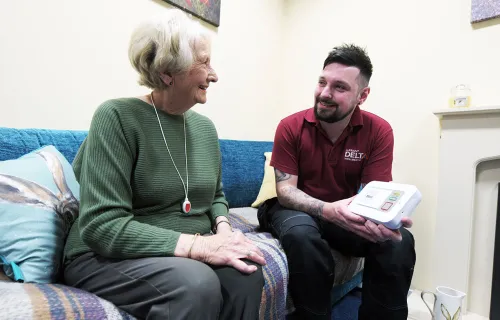The longer I work in transformational delivery in the health and social care sector, the more strongly I believe that strategic partnerships are the central factor in achieving success.
Recently, I recorded a podcast series with our partners Delta Wellbeing, where we explored how the right digital technology and strategic partnerships can be a force in overcoming the significant challenges facing health and social care organisations. This helps them to deliver results that are meaningful to individual patients, as well as to the health professionals and organisations that support them.
It highlighted the fundamental principle that, in vast and complex systems like health and social care, no one organisation can have all the answers. In these situations, strategic partnerships are key to achievements far beyond what any one Trust, Integrated Care Board, Health Board or Regional NHS Board could accomplish if working alone.
One Trust can rightly learn from another but folding in the expertise of a non-health and social care organisation, or one from outside the public sector, can often be the key to pushing that learning up to the next level.
Such organisations are able to look beyond the commissioning Trust or Board’s vistas, creating an excellent mechanism for embedding deep, specialist understanding and knowledge around distinct areas, like data management, customer relationship management and adoption and business change.
Forging productive partnerships within technology ecosystems
Creating a health and social care system that’s both financially viable and ready to support digital engagement with citizens is important to everyone in the UK. We do however need to find new ways to streamline how health and social care organisations navigate complex issues in order to deliver the digital transformation required to support new models of care, including remote patient management. This is critical to transforming and improving the experiences they deliver to patients and those in need of care.
Strategic partnerships are a strong, effective, and thriving route to generating this transformation. Our work with Delta Wellbeing is a prime example. Covering the West Wales region, we are partnering with them to help develop a digital platform that integrates health and care services to support people in their own homes and out and about enjoying their daily lives.
We are integrating a wide range of technologies ranging from improved telecare to the delivery of virtual wards and remote patient management. With our platform, all the threads of data and information from multiple sources deliver a holistic view of the patient and their care, allowing more focus on prevention or early intervention rather than crisis.
In these sorts of engagements, the role of a technology integrator is often to understand and design architectures that deliver a complete view of individual service users, that overcome information silos and implement a standardised data approach. Clearly, multi-agency collaboration and partnership to establish interoperability both at a business process and data integration level is essential, particularly given how many patient and service user touchpoints there are within health and social care.
Key priorities
Within strategic partnerships like these, we’ve identified key priorities that can accelerate results, and that are transferrable to other sectors and situations:
1. Building an inclusive, single vision
Partnerships will always work better when people understand what is possible in terms of the benefits of organisational and technical integration and that when we all collaborate together, amazing things can happen. It’s always important to set out clearly where strategic partners with non-medical or care skills can add value.
This joint understanding requires a cultural alignment between parties and at the forefront of this is strong leadership to optimise any collaboration. Equally important is minimising the threat of duplication of delivery and where a challenge is common within a region, multiple parties setting out to resolve the same issue from a different direction. The togetherness alignment can create in approach establishes efficiencies and naturally results in the delivery of the better outcome more quickly.
2. Being forensic about funding
Collaboration within strategic partnerships needs transparency and dialogue to establish where the funding will flow because, often, those who benefit the most from a particular piece of work may not always be those who have been the first to fund it. A strong sharing mentality is required across the whole system or region, to reinforce buy-in to the end vision of enhanced, more effective care approaches that are centred on the patient or service user experience.
3. Looking wider for innovation
Bringing in key regional organisations such as innovation centres and universities can be a great source of new ideas, opportunities, and provide a real innovation & research focus. This must always be balanced with those organisations delivering care locally, with community engagement and regional awareness to combine a blended approach and finding the formula that will make services in your region flourish.
4. Benefitting from networks and capacity
Opening up the pre-existing supplier and organisational network that your new strategic partner brings can enhance your existing ecosystem. Many proven delivery partnerships, with supported evidence of success, can be utilised to act in each project or advisory setting. In addition, these networks will undoubtedly bring immediate capacity and skills to relieve pressure on present teams and bring forward new skill sets to tackle existing problems and future challenges.
Through new procurement initiatives and projects, we are seeing our sector move to one of being more open and receptive to new partnerships and consortiums when seeking transformational change. For me this is yet another positive step towards us being able to create the right outcomes for our citizens and patients.
Explore how strategic partnerships can work for your organisation
Within technology and beyond, strategic partnerships are powerful tools to drive innovation. Contact me to discuss how CGI can support your organisation, or to find out more about CGI in Health.






